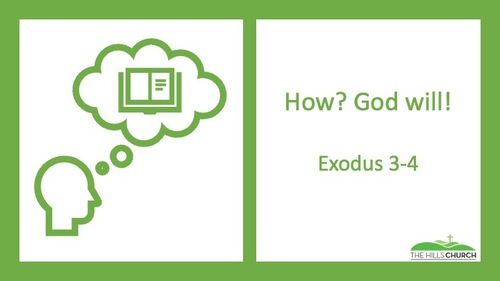Exodus 3-4 - How? God will!
The Impossible Call
In our walk with Christ, God calls us to do the unbelievable and the impossible. The "upward call of God in Christ Jesus" (Phil 3:14) is not some easily attainable goal. It is not a call simply to put our mind to it and through sheer will and determination get it done. The call of following Christ requires us to believe and do things that we are incapable of believing and doing on our own. But what we need to know is that when God calls us, His plan in that call is not that we will accomplish it, but that He will. It is not that we will be able to do it through our own discipline and power. He will.
The Lesson from the Call of Moses (Exod 3-4)
This is one of the great lessons we learn from the story of God calling Moses to deliver the Israelites from their Egyptian captivity and lead them to the promised land of Canaan. Exodus 3 captures the famous story of God appearing to Moses through the burning bush on Horeb, which became known as "the mountain of God." (Exod 3:3) From the very beginning of this story, we see that it is God who calls Moses and God who will accomplish what He calls Moses to do. Notice Exod 3:8: "...I have come down to deliver them out of the hand of the Egyptians and to bring them up out of that land to a good and broad land, a land flowing with milk and honey..." It is God, not Moses, who initiates, acts, and guarantees that the Israelites will be delivered from slavery and into the promised land. Then in Exod 3:10 God says, "I will send you to Pharaoh." Moses seems to miss the point that it is God who will act. He objects and says, "Who am I that I should go to Pharaoh and bring the children of Israel out of Egypt?" (Exod 3:11) The answer to Moses is effectively, "you are nobody." That is, Moses is right: who is he that He could confront Pharaoh and lead a nation? No one would listen to him. But God makes it clear in Exod 3:12 that it is God's activity and presence that makes the difference: "I [God] will be with you [Moses]."
Moses Objects. God Responds.
Moses then issues a series of reasonable objections (at least if accomplishing God's call were left up to Moses) to God sending Moses. In Exod 3:13, Moses objects by questioning who exactly he is supposed to tell the Israelites who God is. God responds, "I am who I am." (Exod 3:14) That is, "I am Yahweh." (Exod 3:15) Moses is to tell the Israelites that God is the one who made promises in the past to Abraham, Isaac, and Jacob that they would possess the promised land. (Exod 3:15,16) He is God not only in the past but now and forever, which means He is entirely able and will always be entirely able to deliver on the promises that He makes. God is effectively saying, "Do NOT forget this! This is who I AM!" (Exod 3:14,15) God then tells Moses even when Pharaoh refuses, Moses does not have to figure out what to do: "I will strike Egypt" and "I will give this people favor in the sight of the Egyptians."
Moses' Continued Objections
Yet Moses continues to object. He issues another three objections:
God answers each one of these with "I will."
This last objection, "Who will go with me?", angers God (Exod 4:14) because Moses is expressing a lack of confidence in God going with Moses being enough. Did not God already tell Moses that God would be with him? Moses is still scared. But God does not relent from His calling of Moses to do this. Rather, God wants it to be seen that what God establishes to be done, God will bring about.
God continues to tell Moses that it is God who will accomplish things. Moses can return to Egypt because God is watching over Moses and knows that it is safe. (Exod 4:19) When Moses faces Pharaoh and Pharaoh refuses, Moses need not worry because it is God who has hardened Pharaoh's heart. (Exod 4:21) So, Moses can be confident God is absolutely in control even of the resistance that Moses will face. If Pharaoh refuses, God will kill Pharaoh's first born son. (Exod 4:23) And it is God who delivers on His promise to send Aaron to meet Moses at Horeb. (Exod 4:27)
What is the outcome of this all? In short, exactly what God calls Moses to do, God delivers on. The elders of Israel are gathered. Aaron speaks the words God has told Moses need to be spoken; Moses performs the signs for them to see. (Exod 4:30) "And the people believed!" (Exod 4:31) Every objection that Moses brings to God comes down to that one statement: "the people believed!" The answer to Moses objection, "what will make them believe?" is "God will!"
And what is their ultimate response to "God will?" Worship! "...they bowed their heads and worshiped." (Exod 4:31) The Israelites proclaim the greatest of God, who He is, what He has done, what He has promised, and what He will do. Why? Because God will!
So as you face the impossibilities of "the upward call of God in Christ Jesus", the seemingly undoable call and commands of the gospel to follow Christ, when you do not know how you will be able to do it...Remember: God will!
In our walk with Christ, God calls us to do the unbelievable and the impossible. The "upward call of God in Christ Jesus" (Phil 3:14) is not some easily attainable goal. It is not a call simply to put our mind to it and through sheer will and determination get it done. The call of following Christ requires us to believe and do things that we are incapable of believing and doing on our own. But what we need to know is that when God calls us, His plan in that call is not that we will accomplish it, but that He will. It is not that we will be able to do it through our own discipline and power. He will.
The Lesson from the Call of Moses (Exod 3-4)
This is one of the great lessons we learn from the story of God calling Moses to deliver the Israelites from their Egyptian captivity and lead them to the promised land of Canaan. Exodus 3 captures the famous story of God appearing to Moses through the burning bush on Horeb, which became known as "the mountain of God." (Exod 3:3) From the very beginning of this story, we see that it is God who calls Moses and God who will accomplish what He calls Moses to do. Notice Exod 3:8: "...I have come down to deliver them out of the hand of the Egyptians and to bring them up out of that land to a good and broad land, a land flowing with milk and honey..." It is God, not Moses, who initiates, acts, and guarantees that the Israelites will be delivered from slavery and into the promised land. Then in Exod 3:10 God says, "I will send you to Pharaoh." Moses seems to miss the point that it is God who will act. He objects and says, "Who am I that I should go to Pharaoh and bring the children of Israel out of Egypt?" (Exod 3:11) The answer to Moses is effectively, "you are nobody." That is, Moses is right: who is he that He could confront Pharaoh and lead a nation? No one would listen to him. But God makes it clear in Exod 3:12 that it is God's activity and presence that makes the difference: "I [God] will be with you [Moses]."
Moses Objects. God Responds.
Moses then issues a series of reasonable objections (at least if accomplishing God's call were left up to Moses) to God sending Moses. In Exod 3:13, Moses objects by questioning who exactly he is supposed to tell the Israelites who God is. God responds, "I am who I am." (Exod 3:14) That is, "I am Yahweh." (Exod 3:15) Moses is to tell the Israelites that God is the one who made promises in the past to Abraham, Isaac, and Jacob that they would possess the promised land. (Exod 3:15,16) He is God not only in the past but now and forever, which means He is entirely able and will always be entirely able to deliver on the promises that He makes. God is effectively saying, "Do NOT forget this! This is who I AM!" (Exod 3:14,15) God then tells Moses even when Pharaoh refuses, Moses does not have to figure out what to do: "I will strike Egypt" and "I will give this people favor in the sight of the Egyptians."
Moses' Continued Objections
Yet Moses continues to object. He issues another three objections:
- What will make them believe me? (Exod 4:1)
- What will make them listen to me? (Exod 4:10)
- Who will go with me? (Exod 4:13)
God answers each one of these with "I will."
- God will enable Moses to perform miraculous signs that only God can do. (Exod 4:2-9)
- God will "be [Moses'] mouth and teach [Moses] what to speak" (Exod 4:12)
- God will go with Moses and even give another person (Aaron) to go with him as well. (Exod 4:14-16)
This last objection, "Who will go with me?", angers God (Exod 4:14) because Moses is expressing a lack of confidence in God going with Moses being enough. Did not God already tell Moses that God would be with him? Moses is still scared. But God does not relent from His calling of Moses to do this. Rather, God wants it to be seen that what God establishes to be done, God will bring about.
God continues to tell Moses that it is God who will accomplish things. Moses can return to Egypt because God is watching over Moses and knows that it is safe. (Exod 4:19) When Moses faces Pharaoh and Pharaoh refuses, Moses need not worry because it is God who has hardened Pharaoh's heart. (Exod 4:21) So, Moses can be confident God is absolutely in control even of the resistance that Moses will face. If Pharaoh refuses, God will kill Pharaoh's first born son. (Exod 4:23) And it is God who delivers on His promise to send Aaron to meet Moses at Horeb. (Exod 4:27)
What is the outcome of this all? In short, exactly what God calls Moses to do, God delivers on. The elders of Israel are gathered. Aaron speaks the words God has told Moses need to be spoken; Moses performs the signs for them to see. (Exod 4:30) "And the people believed!" (Exod 4:31) Every objection that Moses brings to God comes down to that one statement: "the people believed!" The answer to Moses objection, "what will make them believe?" is "God will!"
And what is their ultimate response to "God will?" Worship! "...they bowed their heads and worshiped." (Exod 4:31) The Israelites proclaim the greatest of God, who He is, what He has done, what He has promised, and what He will do. Why? Because God will!
So as you face the impossibilities of "the upward call of God in Christ Jesus", the seemingly undoable call and commands of the gospel to follow Christ, when you do not know how you will be able to do it...Remember: God will!

